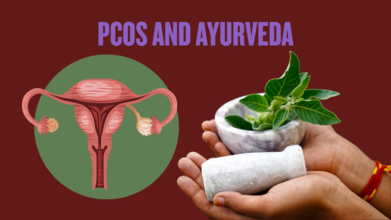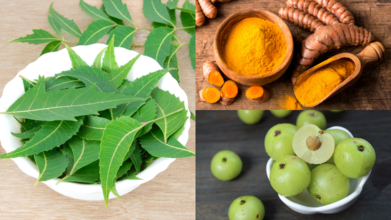- Health Conditions A-Z
- Health & Wellness
- Nutrition
- Fitness
- Health News
- Ayurveda
- Videos
- Medicine A-Z
- Parenting
Can Ayurveda Treat Psoriasis And Heart Disease- All In One Step?

Image Credits: Canva
Amidst the challenges of the modern world- environmental pollution, sedentary lifestyles, and chronic stress which increasingly impact our well-being, the ancient wisdom of Ayurveda offers a refreshing perspective. Ayurveda, a traditional system of healing that has its roots in India for thousands of years, provides a holistic approach to managing chronic conditions such as psoriasis and heart disease. Its philosophy revolves around the belief that the body, mind, and spirit are inextricably linked, and that true healing comes from restoring the balance of the internal energies known as doshas.
The story of Ayurveda begins with an understanding of the human body as a microcosm of the universe. In Ayurvedic thought, the body is governed by three doshas—Vata, Pitta, and Kapha—that represent different combinations of the five elements. When these energies are balanced, the body thrives; however, when they fall out of balance, illnesses manifest. Psoriasis, for example, is often viewed through the lens of an aggravated Vata dosha, which causes dryness and scaling of the skin, combined with an imbalance in Kapha that leads to the thickening of skin layers. In this narrative, the skin becomes a canvas upon which the story of internal disharmony is vividly painted.
Throughout history, Ayurvedic practitioners have used a blend of dietary guidance, herbal formulations, and lifestyle modifications to restore balance. For those suffering from psoriasis, the journey begins with the food they eat. Ayurveda advises embracing a diet that is cooling and detoxifying. Traditional recipes often include a variety of fresh fruits and vegetables, whole grains, and herbs that soothe the body and reduce inflammation. Such diets are not merely nutritional regimens; they are rituals that honor the body’s natural rhythms. The emphasis is placed on fresh, unprocessed foods, while spicy, oily, and sour foods—believed to aggravate the Pitta dosha—are limited, allowing the skin to heal gradually from within.
Herbs have always played a central role in Ayurvedic healing. Neem, for example, is celebrated for its potent antiseptic and anti-inflammatory properties, making it a valuable ally for soothing the irritated skin of psoriasis patients. Turmeric, with its active compound curcumin, is another star in the Ayurvedic herbal repertoire. This spice, long revered for its healing virtues, is thought to reduce inflammation and promote the regeneration of skin cells. Aloe vera, with its cooling and hydrating effects, further complements this therapeutic arsenal. These herbs are used in various formulations, from topical applications to internal decoctions, all aimed at quelling the fiery symptoms and restoring natural balance.
But Ayurveda is more than just a system of herbs and food; it is a way of life. Modern research increasingly supports the idea that stress, inadequate sleep, and a lack of physical activity can exacerbate skin conditions like psoriasis. In response, Ayurvedic practitioners advocate for practices that nurture the mind and body simultaneously. Yoga and meditation are not only physical exercises but also meditative rituals that calm the nervous system and reduce stress—a key trigger for psoriasis flare-ups. Regular practice helps to harmonize the doshas, fostering an environment where the skin can regenerate and heal.
Just as the skin reflects internal imbalances, so too does the heart reveal the deeper state of our overall health. Heart disease, which has become a leading cause of mortality worldwide, is viewed in Ayurveda as a condition known as Hridroga. In this framework, the heart is seen as both a physical organ and the seat of emotions and consciousness. It is believed that an overactive Pitta dosha can lead to inflammation and high blood pressure, while an imbalanced Vata dosha may result in irregular heart rhythms and chronic anxiety. In this intricate dance of energies, the heart becomes the focal point of the body’s struggle to maintain equilibrium in the face of modern stressors.
The modern epidemic of heart disease is not merely a product of genetics or chance; it is, according to Ayurveda, a reflection of the lifestyle choices that have come to dominate contemporary life. Sedentary habits, poor dietary choices, and relentless stress contribute to the disruption of the delicate doshic balance. In the Ayurvedic narrative, a diet that emphasizes whole grains, fresh fruits, and vegetables, while limiting processed foods and unhealthy fats, is essential for maintaining heart health. The inclusion of spices such as turmeric, fennel, and cumin is not accidental; these ingredients are known for their antioxidant properties and their ability to support cardiovascular function.
Herbs also find a place in the treatment of heart disease. One such herb, Arjuna, is particularly valued in Ayurvedic medicine for its cardio-protective benefits. Arjuna is believed to strengthen the heart muscle, improve blood circulation, and even help in managing blood pressure. Alongside dietary changes, Ayurvedic practitioners recommend lifestyle modifications aimed at reducing stress—a known risk factor for heart disease. Practices like meditation, pranayama (breathing exercises), and even aromatherapy are woven into daily routines, helping individuals cultivate inner peace and resilience against the onslaught of modern stressors.
Integrating these ancient practices into a contemporary lifestyle is not always straightforward. The pace of modern life, with its constant demands and distractions, often leaves little room for the mindful rituals prescribed by Ayurveda. Yet, many who have embraced these traditional methods report not only an improvement in their skin and heart health but also a renewed sense of vitality and balance. This transformation is not instantaneous; it is a gradual process that requires commitment and patience. Ayurveda teaches that healing is a journey, one that is as much about rediscovering one’s connection to nature as it is about physical recovery.
The journey toward healing begins with small, deliberate steps. For those facing the challenges of psoriasis, it might start with a simple change in diet or the introduction of a daily meditation practice. For individuals at risk of heart disease, it could be the decision to incorporate more whole foods into their meals or to set aside time for regular physical activity. These changes, though modest, are powerful. They represent a return to a way of living that honors the body’s intrinsic wisdom and its ability to heal when given the proper support.
In reflecting on these ancient practices, one is reminded of the enduring wisdom of Ayurveda—a system that sees disease not as an isolated event, but as a disruption of the natural order of life. Its holistic approach is a reminder that true health comes from within, nurtured by a balanced diet, mindful practices, and the careful use of nature’s own remedies. While modern medicine offers many advancements, the principles of Ayurveda remind us that there is still much to learn from the past. The ancient sages of India understood that the path to health is not found in a pill or a quick fix, but in the continuous, mindful journey of nurturing the body, mind, and spirit.
As we navigate the complexities of modern health challenges, the teachings of Ayurveda offer both solace and guidance. They remind us that by restoring balance within ourselves, we can address even the most persistent of ailments—whether manifested as patches on the skin or as strains on the heart. In this narrative of healing, the timeless wisdom of Ayurveda continues to inspire and guide those who seek a deeper, more harmonious way of living.
Ayurvedic Navel Oiling: The Best Oils To Choose, The Right Way To Do It And Why It Should Be a Part Of Your Everyday Routine

(Credit-Canva)
In the ancient healing system of Ayurveda, the belly button, known as the Nabhi, is considered a very important spot. It's seen as a central point of energy, health, and balance in the body. Applying warm oil to the navel is a simple but powerful self-care ritual that is believed to bring deep healing benefits to both the body and mind.
In modern science, our belly button holds little to no value, some even considering it a scar, as the only purpose it served was as a source of food for babies in the womb. However, considering it was the only source of nutrition we had, one wonders how it can lose its value outside the womb.
Also Read: What Is Leucovorin - The Drug Trump Suggests As A Treatment For Autism?
According to the California College of Ayurveda, navel oiling practice is based on the idea that the Nabhi is connected to our digestive system, or Agni, and helps spread energy throughout the body. By oiling it, you can nourish your core and bring balance to your body's three energy types, or doshas: Vata, Pitta, and Kapha.
Does Oiling Your Belly Button Actually Have Benefits?
For people who are just learning about this ayurvedic practice, this is the first question they ask. In a video, Smt. Hansa Ji from the Yoga Institute of India explained that the benefits of naval oiling are immense.
For Your Skin: Applying oils like coconut, sesame, or almond oil directly to the navel can help deeply hydrate the skin, making it less dry.
For Digestion: For issues like indigestion, bloating, or stomach pain, a mixture of ginger and peppermint essential oils with coconut oil can be applied. This practice is thought to reduce bloating and strengthen your digestive fire.
For Hormones: Gently warming castor oil and massaging it into your navel is believed to help balance hormones and reduce menstrual pain. For fertility concerns, some people use olive oil or guava leaf oil.
For Detoxification: Using neem or castor oil in the navel may help the body flush out toxins and support liver health.
Some other benefits, as mentioned by the California College of Ayurveda were,
For Pain Relief: A little warm castor oil on the navel may help reduce stomach cramps, menstrual pain, and stiff joints by balancing your Vata dosha.
For Eyes and Lips: Oiling the navel with pure ghee or mustard oil is said to improve eyesight and prevent chapped lips by nourishing your body from its center.
For Fertility: Applying ghee or coconut oil to the navel is believed to nourish the reproductive organs and boost overall vitality.
How to Choose the Right Oil
Different oils have different properties, so you can choose one based on what you want to achieve:
- Coconut oil is cooling and is great for balancing a Pitta imbalance.
- Sesame oil is warming and perfect for a Vata imbalance. It also helps with circulation.
- Mustard oil is known for its cleansing properties and benefits to digestion and joint health.
- Castor oil is a powerful healing oil that can help reduce pain and swelling.
- Pure ghee is very nourishing and helps to rejuvenate your body's tissues.
- Neem oil is great for cleansing and is often used for acne-prone skin or for detoxification.
How to Practice Navel Oiling
To do naval oiling one can start by warming up just 2-3 drops of your chosen oil. You can then lie down comfortably and apply the oil directly into your belly button. You can use a dropper for this.
After you are done putting oil in your naval, gently massage the area in a circular motion for about a minute. Leave the oil on overnight or for at least 30 minutes before you wash it off.
Remember to always use pure, high-quality, cold-pressed oils. If you have sensitive skin, it's a good idea to test a small patch of skin first. You should also avoid this practice if you have any infections or open wounds near your navel.
Adding navel oiling to your daily or weekly routine can have a powerful effect on your overall health, from improving your skin and digestion to balancing your hormones and emotional well-being.
Medical studies that support navel oiling
While studies directly linking naval oiling to health benefits are limited, a 2015 research published in the Asian Pacific Journal of Tropical Biomedicine, showed the usage of essential oils for navel oiling can help reduce stress, headaches, insomnia and muscle pain. Another 2023 article published in the Frontier explains how massaging your abdomen may improve your digestion and improve problems like constipation.
Note: Putting oil in your naval is unlikely to harm you but there are still chances of allergens being present or a specific oil not suiting your skin, causing you irritation. Make sure to do a skin patch test and take guidance from a medical professional for advice.
Can Ayurveda Restore Fix Fertility Issues In PCOS What Doctors Often Miss?

Credits: Health and me
For women grappling with fertility issues or irregular cycles, Ayurvedic practitioners often begin with something that feels surprisingly personal—understanding your prakriti, or unique body constitution. Instead of focusing solely on symptoms, the ancient system emphasizes balance: cleansing the body of toxins, restoring harmony among the three doshas, and gently resetting the system through lifestyle and herbal support. For women with polycystic ovarian syndrome (PCOS), this individualized approach can feel like finally being seen, not just diagnosed.
Conventional medicine has made enormous strides in managing health conditions, but when it comes to PCOS, most treatments stop at controlling symptoms with hormone pills, insulin sensitizers, or surgical interventions. The root causes—sluggish metabolism, chronic inflammation, and stress-driven hormonal chaos often remain unaddressed. This is where Ayurveda steps in, not as a replacement but as a deeper, more integrative path to healing.
“PCOS isn’t viewed only as a hormonal disorder; it’s seen as a reflection of deeper imbalances within the body,” says Dr. Manoj Kutteri, Ayurvedic expert in nutrition, acupuncture, yoga, and physical culture. “These imbalances can affect digestion, metabolism, and even mental and emotional well-being.”
Instead of targeting one hormonal pathway, Ayurveda examines the full picture: how your gut is functioning, whether your body can efficiently remove toxins, and how emotional stress shows up physically. This perspective transforms treatment from surface-level management to whole-body healing.
What Is The Role of Doshas in PCOS?
At the core of Ayurveda lies the concept of doshas—Vata, Pitta, and Kapha. Everyone carries all three, but in different proportions. PCOS is often linked to Kapha imbalance, which manifests as weight gain, irregular cycles, slow metabolism, and excess fluid retention. Still, no two women with PCOS present exactly the same way.
“By identifying your individual balance of these energies, Ayurveda designs a treatment plan that’s personalized to you, rather than relying on a one-size-fits-all approach,” Dr. Manoj explains.
For one woman, reducing Kapha heaviness through lighter, warming foods may bring relief. For another, calming Vata might be more important to regulate cycles and ease anxiety. The process is highly individual.
Detox as a Reset Button
A cornerstone of Ayurvedic care for PCOS is detoxification, or Shodhana Kriya. Unlike fad cleanses, these are gentle, physician-guided therapies aimed at clearing ama, toxic buildup that clogs the body’s channels and disrupts hormonal flow.
“Gentle Ayurvedic detox therapies help get rid of ama, which is built-up toxins that block different channels in the body and throw off the balance of hormones,” says the expert. Panchakarma, a series of cleansing therapies, may be recommended in clinical settings, while at-home practices like drinking warm herbal teas, body exfoliation, and mindful eating, serve as accessible daily rituals.
This cleansing process is less about deprivation and more about renewal. By unblocking energy channels and supporting digestion, detox helps the body find its rhythm again.
Lifestyle as Medicine
Unlike quick fixes, balancing the doshas requires sustained changes across all areas of life. Sleep, food, emotional state, and even how you process stress are all seen as part of the healing process.
“You must implement major, mindful lifestyle changes,” Dr. Manoj notes. “Everything from the type of food you eat to the quality and number of hours that you sleep, how you feel emotionally, how you deal with the stress in your body, and self-analysis, everything comes into the picture.”
Herbs such as Shatavari, Asoka, Punarnava, Guduchi, and Triphala often appear in treatment plans. But Ayurveda never prescribes herbs in isolation—they’re always woven into a broader program of nutrition, movement, and emotional balance.
Daily routines also play a central role. Eating freshly prepared meals, practicing gentle yoga, keeping regular sleep schedules, and cultivating emotional awareness aren’t just lifestyle “tips”; they’re considered medicine.
What Are The Signs of Healing from PCOS?
Ayurveda frames healing as a journey rather than a destination. Women with PCOS may first notice subtle shifts lighter digestion, more energy in the mornings, or a steadier emotional state. Over time, cycles regulate, skin clears, and metabolism steadies.
“Ayurveda encourages women with PCOS to listen and understand their bodies, restore their natural rhythm and harmony, and reconnect with their natural vitality and inner self,” says the expert. This philosophy reframes PCOS not as a lifelong battle but as an opportunity to deepen self-awareness and resilience.
Globally, PCOS has become one of the most pressing reproductive health issues, affecting up to 1 in 10 women of childbearing age. With rising rates linked to lifestyle, diet, and environmental stress, the condition demands more than band-aid solutions. Ayurveda’s individualized, root-cause approach offers a complementary path one that empowers women to take charge of their health and fertility.
What this really means is that Ayurveda doesn’t replace modern medicine, but it fills in the gaps addressing the subtle but crucial links between digestion, metabolism, stress, and reproductive health. For many women, this integrated lens offers both hope and tangible results.
PCOS can feel overwhelming, especially when conventional treatments focus narrowly on managing cycles or insulin resistance. Ayurveda broadens the view, inviting women to see their condition not as a permanent burden but as a signal to restore balance physically, emotionally, and spiritually. Healing isn’t instant, but it is possible, when the focus shifts from suppressing symptoms to nurturing the whole self.
Dr. Manoj Kutteri is a Ayurvedic and wellness expert with a comprehensive background in Mind-Body Medicine, Nutrition, Acupuncture, Yoga, and Physical Culture- Medical Director & CEO of Atmantan Wellness Center in India
Clear Skin in the Monsoon: 5 Ayurvedic Superfoods to Beat Breakouts from Within

Credits: Canva
The monsoon brings with it that dreamy smell of rain-soaked earth, endless chai cravings, and… surprise guests in the form of clogged pores, excess oil, and stubborn breakouts. Humidity and temperature swings are basically a free buffet for acne-causing bacteria. Most of us immediately reach for new face washes or a stronger toner, but according to Ayurveda, you might be missing the most important step, fixing what is on your plate.
“Seasonal changes can aggravate doshas, especially Vata and Pitta during the monsoon, leading to inflammation, acne, and rashes,” says Ayurveda practitioner Dr Madhumitha Krishnan. “Along with skincare, it is essential to bring balance through diet by choosing foods that are sweet in nature and slightly oily, which soothe the body and keep skin issues at bay.”
Here are her top five Ayurvedic superfoods that do more than taste good; they keep your skin glowing even when the weather is a mess.
1. Almonds
If almonds could talk, they would probably brag about how well they can multitask. Primarily sweet in taste and slightly oily in nature, they help balance both Vata and Pitta doshas, making them perfect rainy-season companions. Ancient Ayurveda, Siddha, and Unani texts all sing praises for almonds’ skin-enhancing abilities.
“They nourish the skin from within and maintain dosha balance during humid months,” explains Dr Krishnan. The trick? Soak them overnight. This makes them easier to digest and allows their nutrients to work deeper magic on your skin, keeping it supple and radiant.
2. Turmeric
This golden spice is not just for your grandma’s curries; it is basically edible skincare. Known for its antibacterial and anti-inflammatory powers, turmeric supports digestion (which in Ayurveda is key to skin health) and balances Vata dosha.
By slipping turmeric into your daily cooking, you help reduce the inflammation that often fuels acne. “It purifies the blood, wards off infections, and leaves the skin healthier from the inside out,” says Dr Krishnan. Think of it as the quiet hero who works behind the scenes, preventing those surprise breakouts.
3. Amla
Indian gooseberry, or amla, might be tiny, but it is a tridosha balancer with big skin benefits. It boosts immunity, slows down skin ageing, and helps detoxify the body, all of which lower your risk of monsoon breakouts.
“Amla is one of Ayurveda’s most powerful rejuvenators,” says Dr Krishnan. “Its detoxifying action removes impurities that would otherwise show up on the skin.” Whether you have it as juice, powder, or simply raw with a pinch of salt, your skin will thank you.
4. Neem
If breakouts are the troublemakers at the club, neem is the bouncer at the door. Its antibacterial, antifungal, and blood-purifying properties make it one of the most reliable Ayurvedic remedies for clear skin.
“Neem works by flushing toxins from the bloodstream,” explains Dr Krishnan. Neem juice might not win any taste awards, but it’s a small price to pay for skin that stays calm through the muggy season.
5. Garlic
Garlic might not win you any points in the “fresh breath” department, but it is a skin-saving legend. With its Vata-balancing qualities, it fights inflammation from within and supports overall detox.
Dr Krishnan says, “Many wellness experts recommend eating one raw clove of garlic on an empty stomach; it is a potent way to keep skin and overall health in check.” This practice has even gone viral on social media, proving that sometimes ancient remedies can become modern trends.
If you want to win the clear-skin game this monsoon, do not just attack the surface problem. As Ayurveda reminds us, beauty begins from within, quite literally. By adding almonds, turmeric, amla, neem, and garlic to your diet, you’re not just treating your taste buds; you are giving your skin an internal spa treatment.
© 2024 Bennett, Coleman & Company Limited

